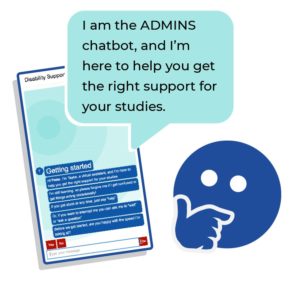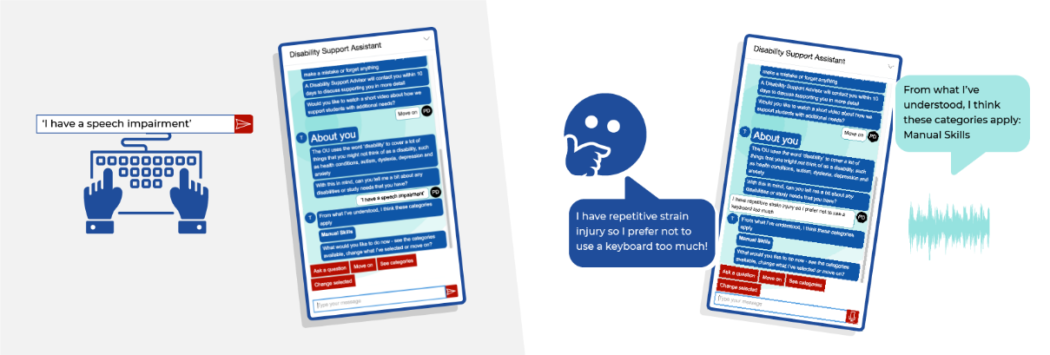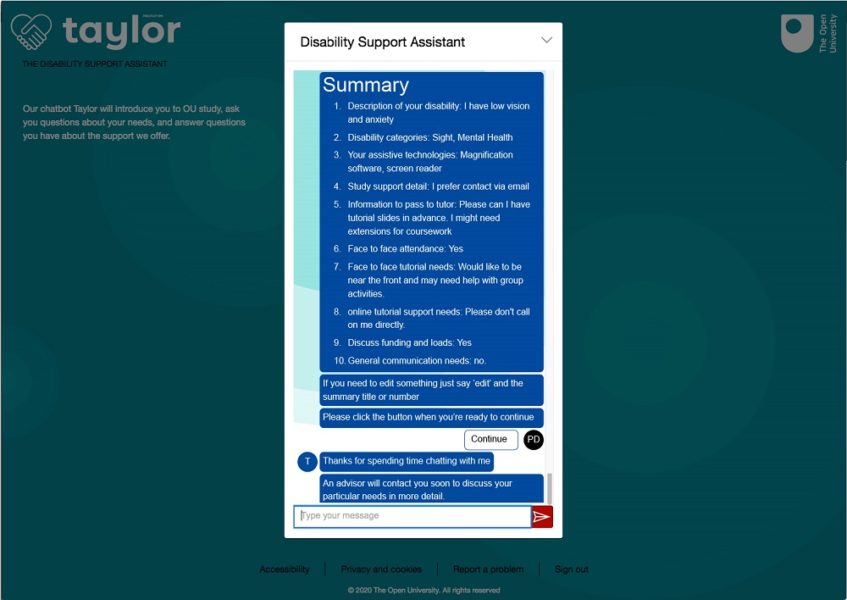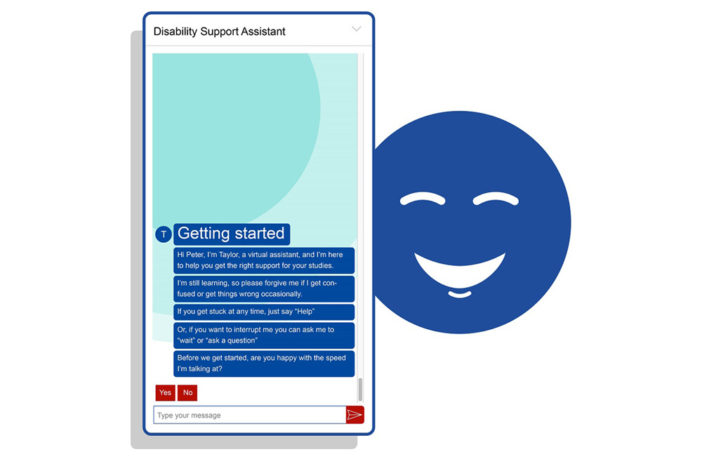The process of disclosing a disability can be a time-consuming, stressful process, which the OU is aiming to improve with a chatbot to support both its students and staff.
The OU’s chatbot, produced through the ADMINS Project, has been developed by educational experts, staff and students to improve disability disclosure processes for people with disabilities.
The ADMINS chatbot, developed in partnership with Microsoft’s AI for Accessibility initiative, uses innovative technologies such as artificial intelligence to allow students to disclose their disabilities through a conversation, rather than filling out a traditional form.
Using feedback from students who have chosen to use the BETA version of the ADMINS chatbot during a trial, educational experts at the OU’s Institute of Educational Technology (IET) are driving improvements in the processes by which students disclose disabilities and arrange for support in relation to their studies at the OU.
Experts at IET believe that using the chatbot will be a more supportive, comfortable way for students to inform the university about their circumstances, accessibility needs and preferred methods of study.
The chatbot has been developed in consultation with OU students, Disability Support Staff and educational experts to identify challenges that students with disabilities face when disclosing their information and provide solutions to improve the process.
1. The chatbot guides students through the disclosure process

Authentic conversation: ADMINS chatbot has been designed to be flexible, leading the conversation and listening to questions.
One of the challenges that students face when disclosing their disabilities is navigating the systems. Research by educational experts at IET has shown that the administrative process of completing disability disclosure forms can feel stressful, isolating and can be time-consuming. Students can find it challenging to work out what impact their disabilities might have on their studies, what support they need, and how they can request it in the disclosure process.
The ADMINS chatbot has been built to be able to guide students through the process of disclosing their disabilities. It does this by following a structured conversation flow (produced by a team of OU experts, staff and students) designed to summarise key information that students share in relation to their needs; for Disability Support Staff to use when discussing with students further.
2. The chatbot answers user questions about OU study and support
The ADMINS chatbot has been designed with the ability to have conversations. It does this with built-in intelligence to respond to students’ questions, provide clarification and support students accessing information.
The ADMINS chatbot, which has been trialled with a group of students at the OU, was developed by a team of experts at the OU’s Institute of Educational Technology, OU disability support staff and students from across the OU who are passionate about improving university processes for students.
Discussing the chatbot further, Ron Turner, BSC Natural Sciences student at the OU, stated:
“For me personally, the chatbot is easier to use than the disability support form.
“I like that I am able to ask questions from the Chatbot that I am not able to ask when I try to fill in the disability support form. It’s good that the Chatbot is flexible. I prefer to speak to the Chatbot, but I know other students prefer to type.
“The Chatbot shows that the OU is concerned about disabled students. As a disabled student, I was very happy to take part in the project that would make it easier for disabled students to find out more about what is available and become involved with the OU.”
3. Users of the chatbot can choose whether to type or speak
Accessibility is of the utmost importance to the OU. Students need to be able to communicate in a way that works for them. The Open University is leading practice in the development of accessible chatbots through this project.
The ADMINS chatbot has been built to understand both text and speech, giving students the flexibility to discuss their needs in a way they most prefer.
Using leading practices and technology, the ADMINS chatbot’s speech functionality allows students to speak into their devices and it can also talk to them. The chatbot then processes the speech and presents it back to the user, to ensure that it has recorded their needs and preferences in a way they’re happy with.

Type or speak: ADMINS chatbot allows students to discuss on their term, understanding both text and speech.
4. The chatbot allows users to respond at their own pace
When developing the chatbot, IET experts consulted with disability support specialists and students at the OU to understand the challenges that students experience when completing the disclosure form. They found that the disclosure process when using the form can be time-consuming, causing students to feel overwhelmed, tired and stressed.
Recognising this, the ADMINS chatbot has been built to allow students to respond at their own pace. Furthermore, consultation with students identified that the pace of conversation needs to be adaptable, as some students may need more time to process and respond than others and there was no ‘perfect’ pace. In response to this, the bot was built to be able to speed up or slow down its speech according to students preference.
Discussing the chatbot further, Ruth Tudor, Doctoral student of Education at the OU, stated:
“It was a pleasure to be involved in this project. I liked the ethos of student involvement from start to finish. I believe the bot is a good idea and once fully functional will be a valuable addition to the disability disclosure process for students.”
5. The chatbot creates a summary of the conversation for the student to review
At the end of the disclosure discussion, the ADMINS chatbot presents the student with a summary of the conversation so far. This allows the student to review their responses and make any changes.
When the student confirms that they are happy with the information in the disclosure summary, the information is securely processed and sent to a Disability Support Advisor at the OU who will be ready to contact the student to discuss their needs and support options further.
Following on from the project and the positive findings of the trial, work will continue in 2021 to explore how to improve and integrate the assistant within the OU, and develop further research in collaboration with other universities.

Summary: ADMINS chatbot provides a summary of conversations for Disability Support Staff to understand students’ needs and contact them with support.
The project team who worked on the ADMINS chatbot include:
- Dr Tim Coughlan, Senior Lecturer in Education and Human-Computer Interaction, ADMINS Project Lead
- Kate Lister, Lecturer in Education Studies, ADMINS Organisational Process and User Engagement Lead
- Kevin McLeod, Senior Learning and Teaching Technologies Manager, ADMINS Technical Project Manager
- Dr Nick Freear, Educational Technology Developer, ADMINS Chatbot Developer
- Dr Richard Greenwood, Educational Technology Developer, ADMINS Chatbot Developer
- Peter Devine, Educational Technology Designer, ADMINS Chatbot Design consultant
- Paul Maher, Senior Product Development Manager
- Dr Francisco Iniesto, Postdoctoral Research Associate in Technology Enhanced Learning, ADMINS Researcher
To learn more about how a chatbot like ADMINS can help your institution support staff and students, see the Project Page and contact our experts.
 James works as the Communications Manager for the OU’s Institute of Educational Technology. He trained as an international journalist at the Dutch and Danish Schools of Journalism and has worked on number of political events for the BBC and Sky News. In his spare time James enjoys cooking, playing sports and planning his next break away.
James works as the Communications Manager for the OU’s Institute of Educational Technology. He trained as an international journalist at the Dutch and Danish Schools of Journalism and has worked on number of political events for the BBC and Sky News. In his spare time James enjoys cooking, playing sports and planning his next break away.



